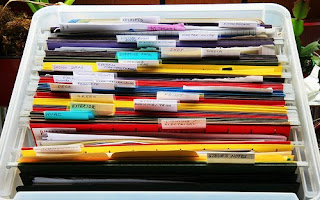How to name music files
May 04, 2010 in files and folders by Dan Gravell
 Naming music files is important. Without a consistent and correct naming scheme your music files will be hard to organise. In some music players it can make music difficult to select. This blog post describes how I name my music files.
Naming music files is important. Without a consistent and correct naming scheme your music files will be hard to organise. In some music players it can make music difficult to select. This blog post describes how I name my music files. In general, information about a track should be stored inside the file itself, in 'tags'. However, you should also keep some of the same information about a track in its filename. Sometimes you must organise or play your music via software that only reads filenames, not the internal tags embedded within. An obvious example is a file explorer such as Windows Explorer. Less obvious is where you use a music player that does not support the tags your music files contain. For instance, Nokia mobile phones running Symbian v9.2/Series 60 v3 have no support for ID3v2.4 out-of-the-box.
Importantly, the information in the filename must be the same as the information embedded in tags in the music file. If they are different, life will soon get very confusing.
So long as your music files are named correctly, you can organise or view them in any application. It's a great fallback!
What should be included in a music file name?
First, the name of the song! The name is most important, because without the name you don't know what music is contained within the file.Also important is the track number within the track's album. This is important so that files are ordered correctly by file name. If you are queuing music to play by selecting files in a file explorer, this is the only way they can be selected to play in order. It's also good to left pad the number with '0's, e.g. 01, 02... 10, 11 so that tracks are not ordered 1, 10, 11, 2, 3 and so on.
Optional are album and artist names. I think these are only required in flat music directory structures. I, on the other hand, store music files in an artist/album manner. This means they aren't required in the file names.
In theory you could also include genre, and other tags. However, this would make the filename long and more difficult to read. It also opens a greater possibility of inconsistency between the filename and internal tags, because tags like genre are more likely to change than tags like track name or track number.
It's generally worth removing spaces in your filenames. This isn't always required, but you may find some applications don't work well with your music if they contain spaces. Ditto for Unicode characters outside of the 'normal' range for your computer.
How your music files' names should read
In my music collection, files are named:[track number]-[track name].[file extension]For instance:
02-The_Landing.flacNote:
- The track number comes first - this means the files are correctly ordered
- The track number is padded with a zero. This helps where there are more than nine tracks
- The track name is there. It's space is replaced with an underscore '_'
- The track number and name are separated by a hyphen
So that's sorted then...
Unfortunately not. Remember what I said about the information in the filename being the same as the information in the tags? The real pain comes when you have a large music collection. If you want to change how your filenames are formed, or you want to change some of the information itself that is in both the filename and tags, then replicating the two can be a tedious and error prone process. Worst, you may just give up (but who could blame you?!). Existing tools like Jaikoz, Tag & Rename and MP3Tag help with this, although they don't generally operate in a fully automated manner.I am hoping to introduce music file management to bliss. soon. As you'd expect, this will be management by rules, so you will state how your files should be named and bliss will rename them in bulk for you (or at least tell you where an album's tracks are not compliant with the name rule).
And that is how I name my music files.
Thanks to Velo Steve for the photo used at the top of this post.

